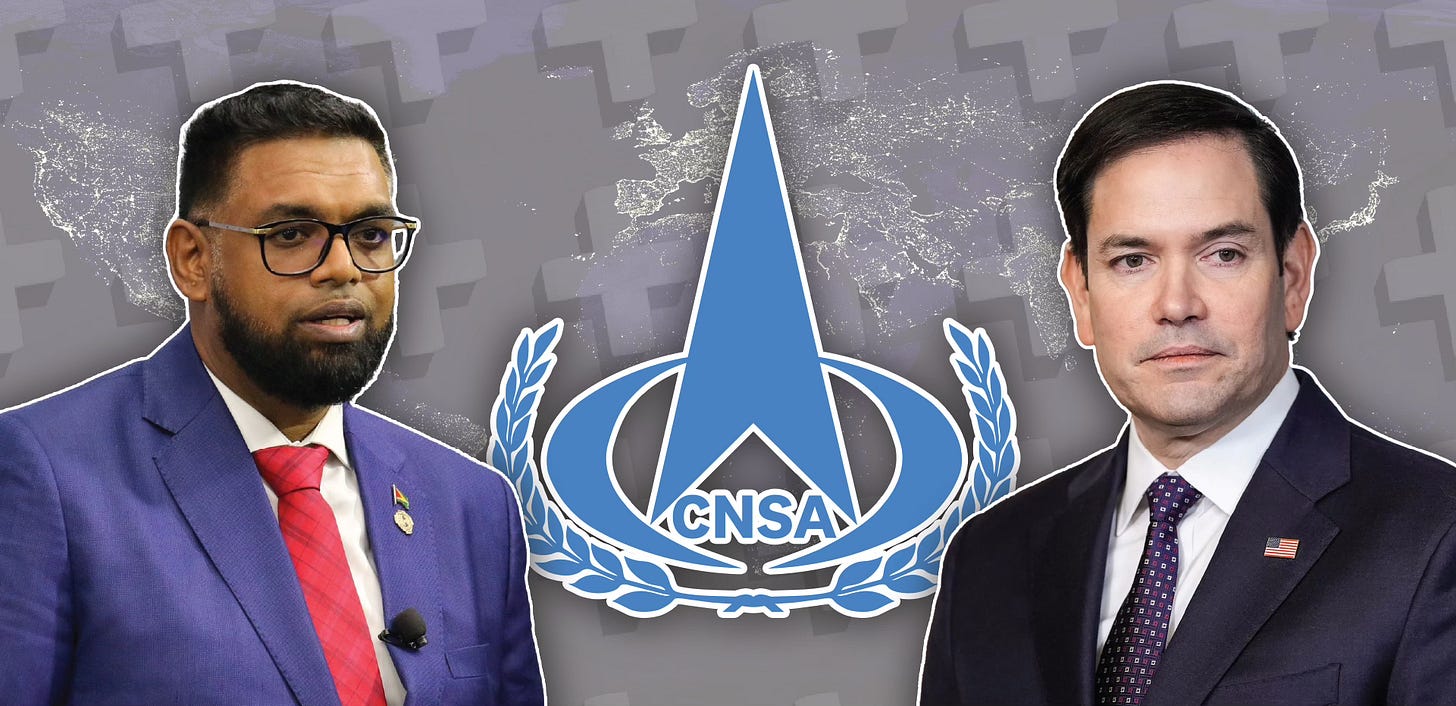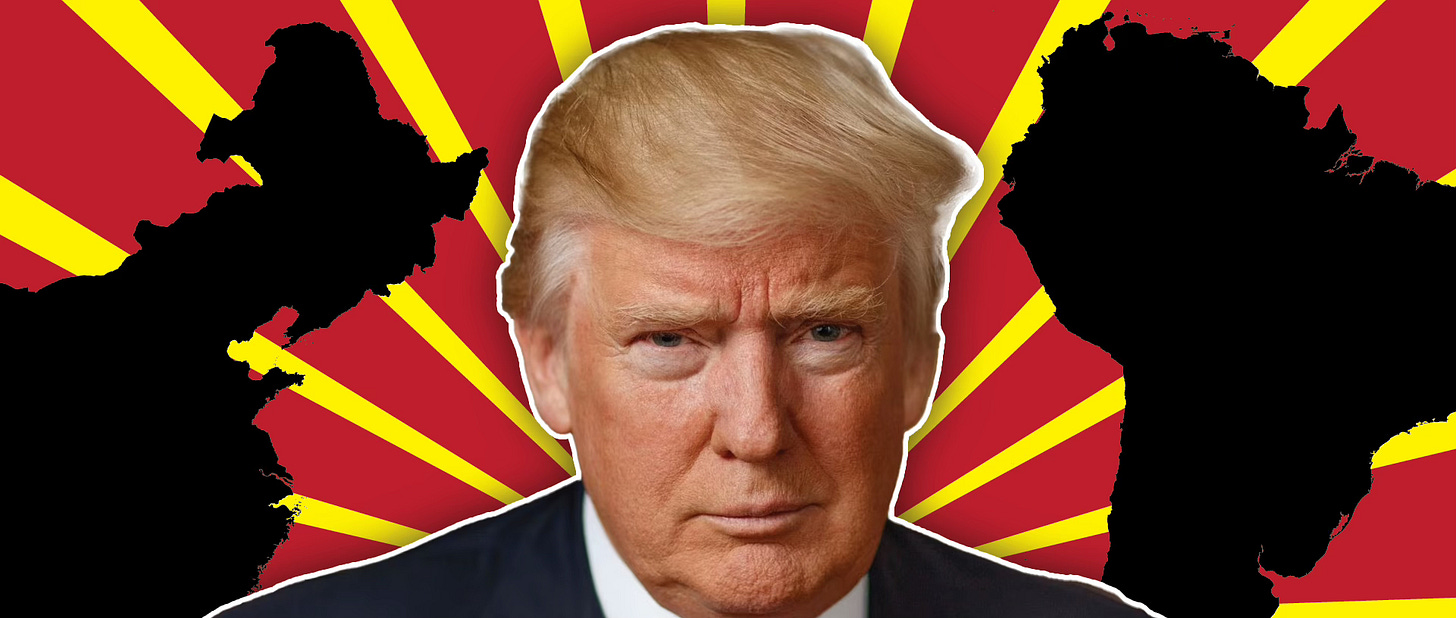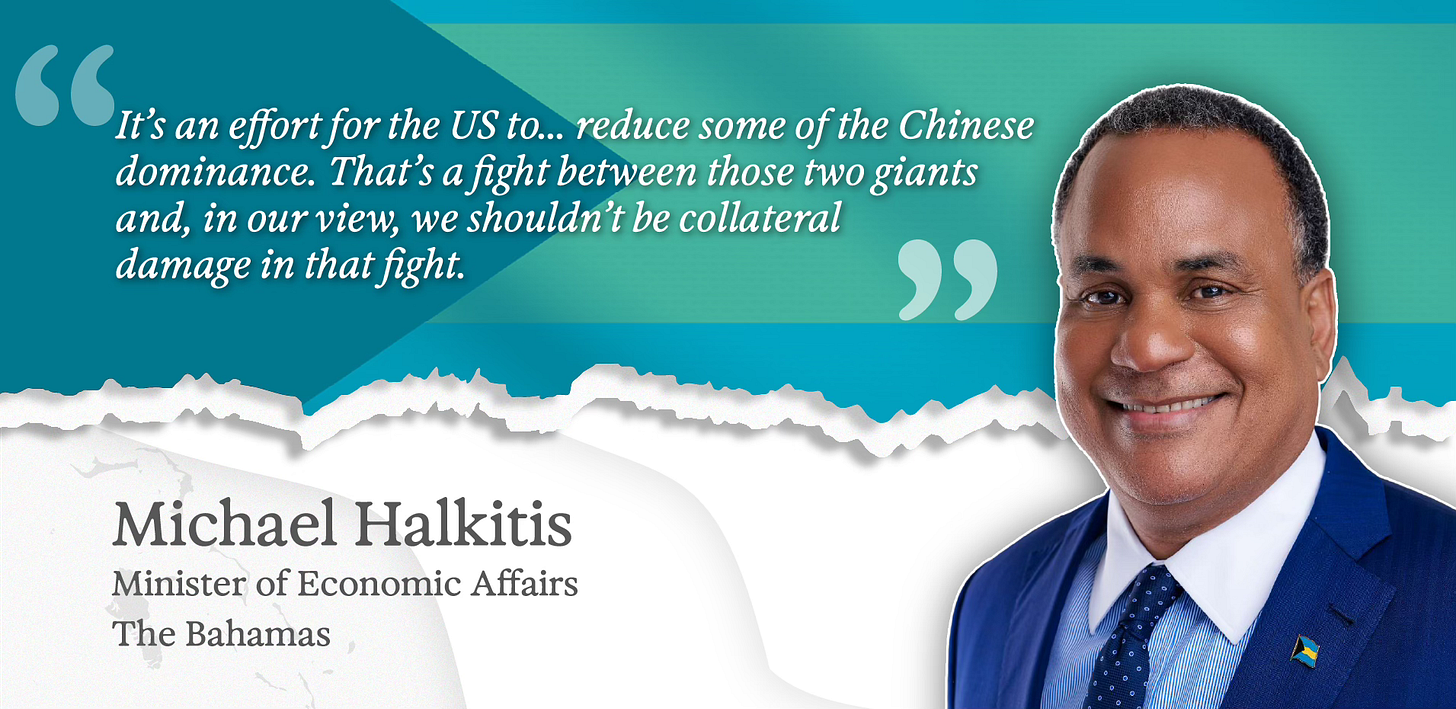Collateral Damage
U.S. fees on Chinese vessels hurts the Caribbean, BYD's Mexico concerns, Ecuador pauses PRC oil investment, and Chile reviews Chinese space cooperation
Welcome to Chaufa, a China-Western Hemisphere Newsletter by CPSI.
Today’s edition covers March 11 to March 24
Listen on Spotify
The Top 6 Stories:
Guyana’s President Irfaan Ali said that the Trump Administration’s plan to charge fees on shipping fleets that include Chinese-built or flagged vessels could particularly hurt Caribbean hydrocarbon-exporting countries like Guyana, Suriname, Trinidad and Tobago. However, Bahamian business officials have suggested that their country could act as an intermediary for companies looking to avoid the fees.
Secretary of State Marco Rubio is expected to visit Jamaica, Suriname, and Guyana at the end of March. These countries’ leaders plan to raise the issue of fees on Chinese ships during the visit.
The U.S. Trade Representative announced the Section 301 investigation into Chinese shipping and possible fees on PRC-built vessels in late February.
The Trump Administration announced a new 25% tariff on any country that imports oil from Venezuela, which will be effective on April 2. China is currently the largest importer of Venezuelan oil (68% of Venezuelan exports in 2023), so the tariff would likely largely target the PRC.
Other countries, including the United States, Spain, Cuba, and Singapore also purchase Venezuelan oil, but at a much smaller percentage.
Washington has already placed a 20% tariff on Chinese exports, and is likely to at least double that with the “reciprocal tariffs” planned for April 2. Beijing might prefer a roughly 40% cumulative tariff over a 65% one, but given the Trump Administration’s inclination to unpredictably impose tariffs on its trading partners, this tariff probably won’t end Venezuelan oil exports to China.
Chile’s foreign ministry said that it is reviewing the agreement between the Chinese government and the private Catholic University of the North for access to the Ventarrones Astronomical Park. The review comes in part because Washington’s embassy “has been clear for some time in expressing its concern” about the cooperation and its possible military applications.
The Chinese-Chilean Ventarrones cooperation is one of many space cooperation projects that have drawn DC-based analysts’ concern. However, the level of cooperation at Ventarrones pales in comparison to the Espacio Lejano Station in Argentina, which has been directly administered by the China National Space Administration for years now. If U.S. pressure increases in the region, this could be the next project to cause a raucous.
Chinese officials have reportedly started to push back against the Black Rock-CK Hutchison (CKH) Holdings port deal that included two key Panamanian ports. A Beijing-affiliated newspaper article critical of the deal was republished by Hong Kong’s government, while the Wall Street Journal reported that President Xi was “angered” by the transaction. Still, the Economist argued that China probably won’t block the deal.
Amid this kerfuffle, the deputy head of the CCP’s International Department, Ma Hui, led a delegation to Panama to meet with local political party leaders. (Xinhua)
President Trump has been using Chinese companies’ presence near the canal as a rationale to threaten to take back the waterway since last year. However, while this deal would ideally mollify his administration’s greatest concerns, shortly after the deal was announced, Trump still insisted that his administration planned to “reclaim” the canal.
The PRC’s Ministry of Commerce delayed its approval of EV firm BYD’s potential new plant in Mexico due to concerns that the facility’s proximity to the United States could allow North American companies access to the firm’s advanced technology and know-how.
Just weeks after Ecuador had granted Sinopetrol (and a Canadian firm) the exploitation rights at one of the country’s largest oil fields (Sacha), the Ministry of Energy canceled the company’s contract over Sinopetrol reportedly not paying the $1.5 billion deposit on time. In response, the Chinese embassy called for the Ecuadorians to “provide a fair, equitable, transparent and non-discriminatory commercial environment for foreign companies, including Chinese companies.”
Sacha is Ecuador’s most productive oil field, producing 75,000 barrels per day (or 15% of Ecuador’s output). Earlier this month, an Ecuadorian trade union had criticized the government’s decision to let Chinese and Canadian firms take over the Sacha oil field.
Core Brief
Taking stock of the Trump Team’s China-LAC obsession
It’s been just over two months into the second Trump Administration, and from tariffs to Twitter (X) feuds, the administration’s foreign policy strategy and priorities are coming into focus.
Last summer, I wrote about how a second Trump term could influence China-LAC ties. Specifically, I highlighted that the new administration’s blueprint, called Project 2025, highlighted three areas of concern, namely: “disrupting Chinese fentanyl flows through Mexico, near-shoring manufacturing away from the PRC, and combating the regional ‘external pressure’ and ‘security threats’ from the PRC (such as through Beijing’s support for countries like Venezuela and Cuba).”
Though “near-shoring” has mostly gotten short shrift, so far the campaign’s priorities appear to more or less be the administration’s strategy. But whether it’ll curtail China’s role in the region remains to be seen.
“External pressure” and “security threats”
Even before Trump took the oath of office, he had been complaining about Chinese influence at the Panama Canal. In just two months, this has resulted in threats to invade Panama, Secretary Rubio’s first foreign trip being to Panama, an eventual deal for Panama to withdraw from the BRI, and the sale of two Chinese ports. Yet these have still not seemed to mollify Trump himself.
Other external threats highlighted by the administration so far include: China’s intelligence presence in Cuba, the possible political pressure created by Chinese investments, and Huawei’s cybersecurity threat to Costa Rica.
Some of these have long been flagged by the DC-based security community, while others are new concerns. Altogether, if the administration can plausibly claim that China is pressuring a LAC country or creating a security threat for the United States, it seems that Trump’s team is going to try to eliminate that “threat.”
Fentanyl flows
One of Trump’s first actions after his inauguration was announcing new tariffs on Mexico, Canada, and China for their supposed role in fentanyl trafficking to the United States. Though the 25% tariffs on the North American neighbors were paused, a 20% tariff on PRC exports was put into effect.
What’s missing? Any substantial negotiations, it seems. Canada and Mexico have largely re-packaged previous commitments to try to push off the new administration’s complaints. And while the Biden Administration set up some talks with the Chinese over fentanyl precursors, which did appear to have some limited results, the PRC and Trump’s team haven’t been interested in the same.
The near-shoring conundrum
Rather than taking a “near-shoring” approach to trade decoupling with China, the administration seems to be following an “America-shoring” policy. Though Trump’s team has been putting tariff after tariff on Chinese exports, (so far) they don’t seem interested in actively redirecting that trade to the U.S.’s southern neighbors. No FTA negotiations have been announced, nor have any grand trade or investment initiatives like the Americas Partnership been proposed. Instead, the administration is threatening tariffs on its closest trade partners through a “reciprocal tariff” proposal and a million-dollar fee on any goods shipped on Chinese ships, regardless of the country of origin.
What’s more, the previous administration’s efforts to near-shore some industries, such as semiconductors, to LAC might be on the chopping block. Take, for example, the CHIPS Act. The law provided new funds for Washington’s regional partners like Costa Rica and Mexico to develop their semiconductor industries. But with Trump’s aspirations to repeal the law, the financial incentives for these projects are probably at risk.
What’s next?
The past few weeks have seen quite a few LAC countries pull back from engagement with China. The cancellation of Sinopetrol’s lease of Ecuador’s largest oil bloc1 to an investigation into space cooperation in Chile, to Mexico floating new trade barriers on Chinese exporters all indicate that the region is preparing for yet more Trump Administration complaints about Chinese “external interference.”
While some of these actions might be independent of the current White House’s concerns, they certainly will help feed into Washington’s narrative about the dangers of engagement with the PRC. Moreover, they show that the region is preparing for more complaints and coercion from the next four years of this administration.
The Roundup
Politics and diplomacy
After traveling to Panama (see above), the Deputy Head of the CCP’s international department visited Brazil and met with local officials, including Vice President of the Senate and ruling Workers Party member Humberto Costa. (CGTN)
Chinese Premier Li Qiang sent a message of congratulations to Stuart Young on assuming the premiership in Trinidad and Tobago. (China Daily)
Even as Ottawa has sought to reduce tensions with Beijing, Canada’s foreign minister revealed that the PRC had recently executed four Canadian citizens over drug offenses.
The PRC’s Special Representative for Latin American Affairs, Qiu Xiaoqi, discussed “deepening practical cooperation in various sectors” with Venezuela’s ambassador. (VTV)
A new scandal is brewing in Argentina related to the National Institute of Tourism Promotion (INPROTUR) paying local firm Puken Media S.A. $200,000 for promoting Argentina’s tourism industry on Chinese social media like Weibo and WeChat.
Investment, finance, and infrastructure
163 Chinese workers who had been building a BYD plant were rescued by Brazilian authorities. The plant’s construction was stopped several months ago over concerns about the workers’ slavery-like conditions. Still, BYD is planning to build two new research centers in the country.
China will donate a $2.4 million mobile wastewater treatment plant to the island of Roatán in Honduras, with the project’s financing, construction, and technical assistance managed by Chinese firms.
Nicaragua’s government both announced that CCCC had started construction on a $68 million, 67MW solar project in Darío and that Min Fu Steel’s new $50 million steel recycling plant would begin operations this summer. The plant will be the largest in Central America.
The Venezuelan transportation ministry signed a “strategic alliance” agreement with a Chinese firm to construct, install, and maintain steel bridges across the country.
Trade and Technology
China’s customs administration and Bolivia’s land ministry signed a phytosanitary protocol to facilitate sorghum exports without volume limits.
The Argentine and Chinese customs offices agreed to new health protocols that would re-permit for poultry exports from the South American country to the PRC.
Venezuela’s Minister of Agriculture, Julio León Heredi, signed an agreement with China to formalize a “sugar strategic alliance” and to promote sustainable development in the agriculture sector.
China’s ambassador to Dominica announced that a Chinese firm plans to open a “Distribution Center of Chinese Goods in Dominica” that will supply local retailers.
The Peruvian government launched yet another anti-dumping investigation into Chinese exports, this time into hot-rolled carbon steel tubes.
Taiwan
The St. Kitts and Nevis foreign minister reaffirmed his country’s commitment to Taiwan during a trip to the country. He also reviewed possible investment opportunities in meetings with Taiwan’s president, foreign minister, and other officials.
Taiwan’s foreign ministry congratulated Belizean Prime Minister Briceno on re-election and committed to deepening ties with Briceno’s government. Belize is expected to maintain diplomatic relations with Taiwan under a continued People's United Party (PUP)-led government.
A delegation from the ROC’s National Security Bureau led a training program with its Guatemalan security and defense counterparts. Notably, this marked the first time that the Taiwanese intelligence service Special Service Command Center participated in this program.
Taiwan and St. Vincent launched a new $1.16 million, two-year agriculture training project for young farmers, while the TX Foundation donated $110,000 in educational supplies, and the Simply Help Foundation offered $66,000 in goods to the social development ministry. At the same time, a Taiwanese medical mission recently started its work in the country.
A delivery of 20 Taiwanese electric buses just arrived in Paraguay. The vehicles are part of a broader donation from Taiwan.
Society and culture
The Francisco Morazán National Pedagogical University (UPNFM) of Honduras and the Zhejiang University of International Studies (ZISU) signed an MOU to establish the country’s first Confucius Institute. (CGTN)
The Chinese government donated four small planes to Bolivia that can seat about 50-60 passengers each to facilitate flights in the interior of the country.
Analysis and Opinion
A new report from the Atlantic Council by William Piekos on how China encourages Taiwan’s diplomatic allies to end their recognition of Taipei argues that “the key to Beijing’s success lies in the use of positive economic inducements, buttressed by the promise of economic growth and investment. While additional variables are at play—including “subversive carrots,” coercion, and personal ties—recent switches have been accompanied by lavish promises of aid, investment, and trade.”
The New York Times published a piece by Keith Bradsher on how Chinese officials are increasingly worried that “Washington’s pressure could force Mexico to close its market to Chinese goods in exchange for a reprieve from American tariffs.”
Arendse Huld wrote for China Briefing about how Sino-Canadian relations could evolve under either a Carney or Poilievre government.
The Diplomat published a piece by Evan Ellis on the current state of Sino-Mexican ties amid the tensions created by U.S. tariffs.
Chinese Ambassador to Jamaica Chen Daojiang wrote an op-ed for the Jamaica Observer about how “China is willing to further strengthen exchanges of experience in state governance with Caribbean countries” in the context of the recent CARICOM summit.
Ewan Palmer wrote about how “China's rising influence in the Caribbean and Latin America in recent years has raised concerns about its potential political and economic impact on Florida” for Newsweek.
That’s it for now, see you again in two weeks!
Make sure you don’t miss the next issue of Chaufa 👇
This definitely could simply be a plain-old commercial dispute, but the timing is certainly suspicious.



